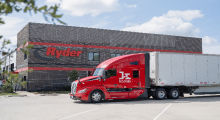Walmart Inc. and Gatik announced this week that Gatik has been operating autonomous trucks without a safety driver behind the wheel in a delivery route for Walmart in Bentonville, Ark. The driverless deliveries are moving customer orders between a Walmart “dark store” and a Neighborhood Market with a fleet of multi-temperature autonomous box trucks.
“Through our work with Gatik, we’ve identified that autonomous box trucks offer an efficient, safe, and sustainable solution for transporting goods on repeatable routes between our stores,” said Tom Ward, senior vice president of last mile at Walmart U.S. “We’re thrilled to be working with Gatik to achieve this industry-first, driverless milestone in our home state of Arkansas and look forward to continuing to use this technology to serve Walmart customers with speed.”
Founded in 2017 by veterans of the autonomous technology industry, Gatik focuses on short-haul, business-to-business (B2B), “middle-mile” logistics for Fortune 500 retailers such as Walmart and Loblaw. The company, which has offices in Mountain View, Calif., and Toronto, has depoyed its Class 3 to 6 autonomous box trucks in markets including Texas, Arkansas, Louisiana, and Ontario.
Gatik said that it has raised a total of $114.5 million and that it has partnered with industry leaders including Ryder, Goodyear, and Isuzu.
Gatik, Walmart claim industry first
Gatik said its deployment with Walmart is the first time that an autonomous trucking company has removed the safety driver from a commercial delivery route on the middle mile anywhere in the world.
The startup said its fully driverless operations, which began in August 2021, involve consistent, repeated delivery runs multiple times per day, seven days per week on public roads. It added that they “unlock the full advantages of autonomous delivery for Walmart’s customers: increased speed and responsiveness when fulfilling e-commerce orders, increased asset utilization, and enhanced safety for all road users.”
“This milestone signifies a revolutionary breakthrough for the autonomous trucking industry,” said Gautam Narang, co-founder and CEO of Gatik. “Our deployment in Bentonville is not a one-time demonstration. These are frequent, revenue-generating, daily runs that our trucks are completing safely in a range of conditions on public roads, demonstrating the commercial and technical advantages of fully driverless operations on the middle mile.”
In December 2020, Gatik and Walmart said they received the Arkansas State Highway Commission’s first-ever approval to remove the safety driver from Gatik’s autonomous trucks, following the completion of 18 months’ successful operations.
As part of its roadmap to operating fully driverless, Gatik undertook a comprehensive stakeholder engagement strategy involving state and local leadership and emergency services. The company plans to contiue ongoing informational workshops about its autonomous operations.
“Arkansas and Gatik have shifted into the future with Gatik’s self-driving delivery truck,” said Arkansas Gov. Asa Hutchinson. “It is fitting that Arkansas, which is home to the greatest retail companies in the world, is the launching pad for this innovation in retail delivery.”
Gatik keeps focus on safety
Since it began commercial operations in 2019, Gatik said it has achieved a 100% safety record across multiple operational sites in North America. It added that it focuses exclusively on fixed, repeatable delivery routes to maximize safety, using proprietary, commercial-grade autonomous technology purpose-built for B2B short-haul logistics.
By constraining the operational design domain, Gatik said it has been able to achieve the safe removal of the safety driver more quickly than developers working on other applications, such as passenger transportation or business-to-consumer (B2C) delivery. The complex urban route in Bentonville involves safely navigating intersections, traffic lights, and merging on dense urban roads.
As retailers turn increasingly to hub-and-spoke distribution models to meet consumer needs, the middle mile has emerged as a critical component of the supply chain. In the past decade, shorter, urban routes have become more prominent, with 65% of all routes under 500 miles and routes under 100 miles growing by 37% in the past decade. Gatik claimed that its autonomous trucks can help increase efficiencies and meet consumer needs immediately.
Article topics
Email Sign Up
















